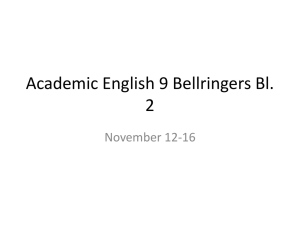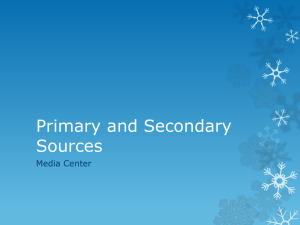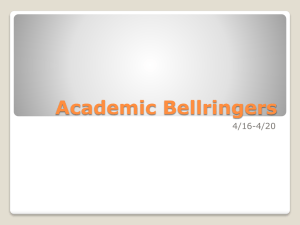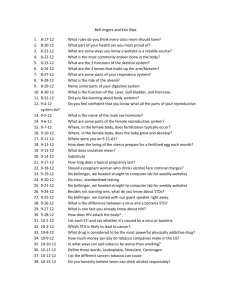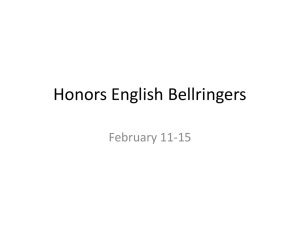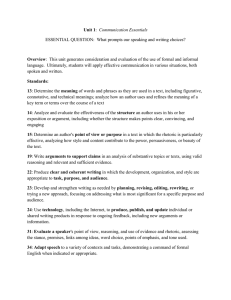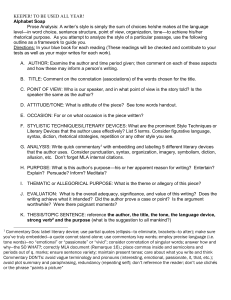Short Stories Bellringer #1 11/21/13
advertisement
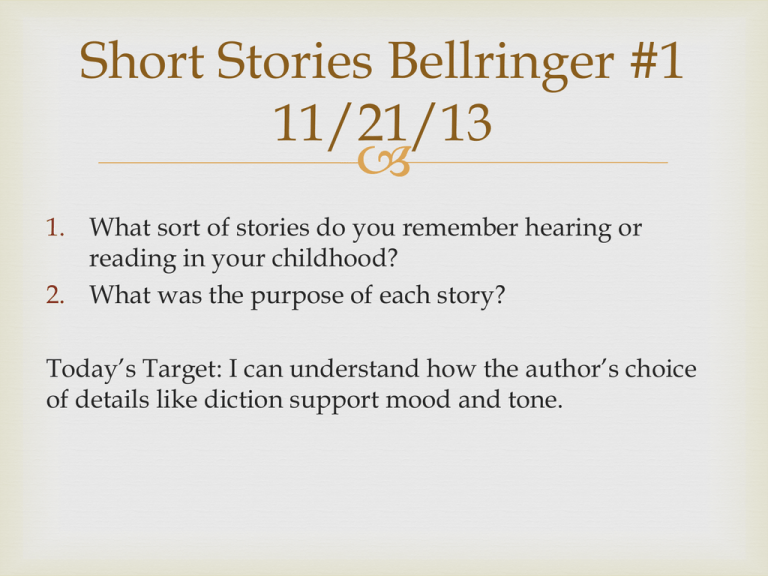
Short Stories Bellringer #1 11/21/13 1. What sort of stories do you remember hearing or reading in your childhood? 2. What was the purpose of each story? Today’s Target: I can understand how the author’s choice of details like diction support mood and tone. Short Stories Bellringer #2 11/22/13 The tone of “Shock-Headed Peter” is negative (condescending, grim etc.). 1. Choose a word from the positive side of the tone words sheet. 2. Rewrite “Shock-Headed Peter,” changing diction so that the tone fits the positive word (The meaning/lesson should stay the same, only the tone should change.). Just look at him! there he stands, With his nasty hair and hands. See! his nails are never cut; They are grimed as black as soot; And the sloven, I declare, Never once has combed his hair; Anything to me is sweeter Than to see Shock-headed Peter Today’s Target: I can understand how the author’s choice of details like diction support mood and tone. Short Stories Bellringer #3 12/2/13 1. What was life like in the 1950’s? How did people behave? What was the social expectations of that era? 2. How did these expectations change in the 1960’s? Today’s Target: I can analyze and evaluate the author’s use of literary devices to create meaning. Short Stories Bellringer #4 12/3/13 1. Think about the short story we read yesterday called “A&P.” If the manager represents the typical person from that era, what does Sammy the narrator ultimately symbolize? 2. Think about the vocabulary term you learned yesterday: commodification. How did you see this term applied in this short story? Give a specific example. Today’s Target: I can analyze and evaluate the author’s use of literary devices to create meaning. Short Stories Bellringer #5 12/4/13 1. Write a journal about the following question: Do you believe love can last forever and how do you think love relates to marriage? Can love ever create unhealthy situations for individuals? Why or why not? Today’s Target: I can analyze and evaluate the author’s use of literary devices to create meaning. Short Stories Bellringer #6 12/5/13 1. Why does the old man call his poison “glove cleaner” or “life cleaner?” 2. Which description do you think is more accurate? Explain. 3. Do you think it would ever be morally justifiable to use such a concoction? Explain. Today’s Target: I can analyze and evaluate the author’s use of literary devices to create meaning. Short Stories Bellringer #7 12/9/13 1. Irony occurs when the unexpected happens. It is about expectations. If you were writing the second chapter of “The Chaser”, how could you make the ending ironic? Today’s Target: I can analyze and evaluate the author’s use of literary devices to create meaning. Short Stories Bellringer #8 12/10/13 1. That is the denotative meaning of the word “lottery”? Use your phone or a dictionary to look up the definition. 2. What connotative associations do you have with this word? What feelings do you associate with this term? Why? 3. What would you do if you won the lottery? List the first five things you would do with your winnings. Make sure your answers are school appropriate! Today’s Target: I can analyze and evaluate the author’s use of irony and other literary devices to create meaning.
